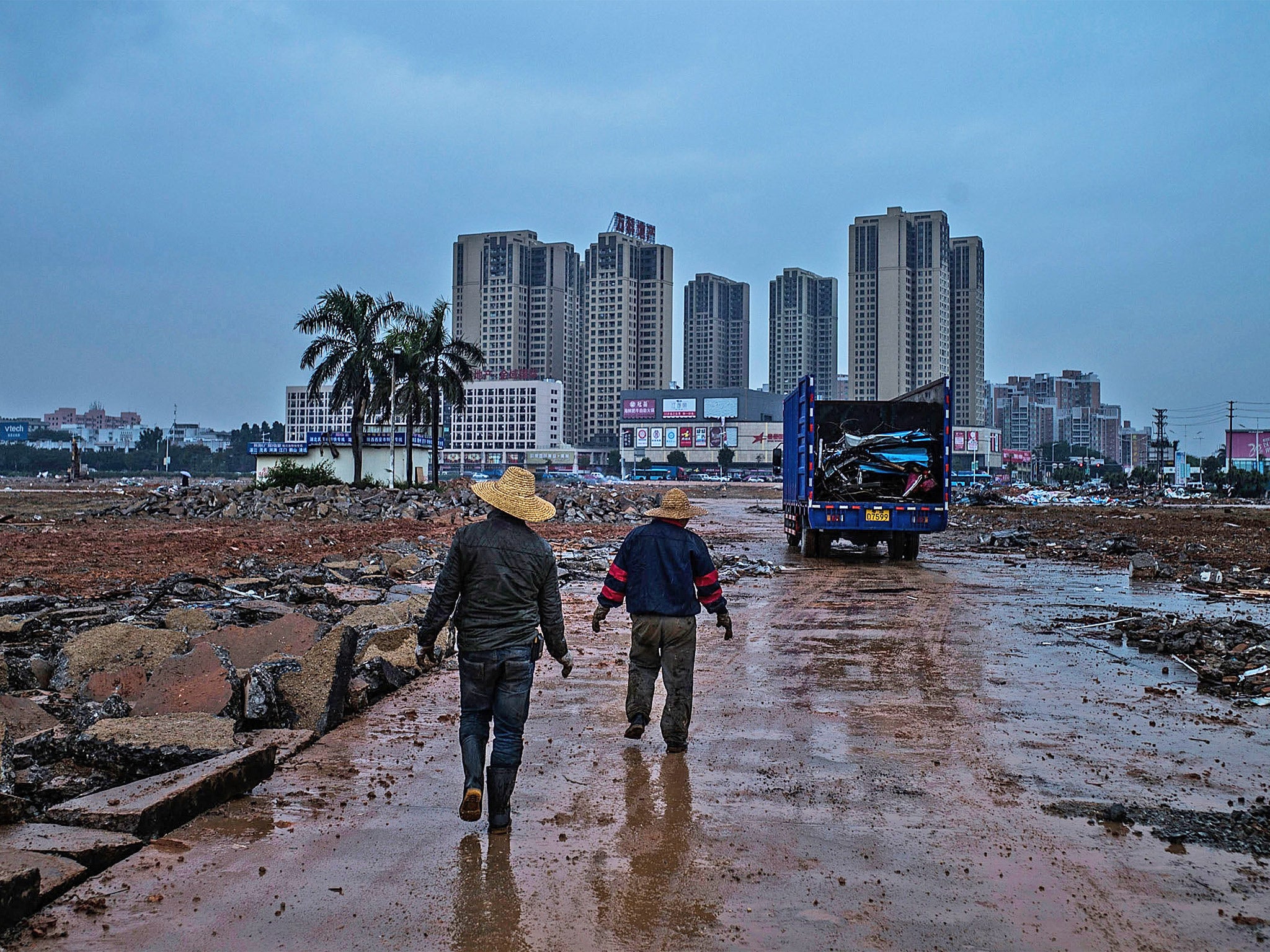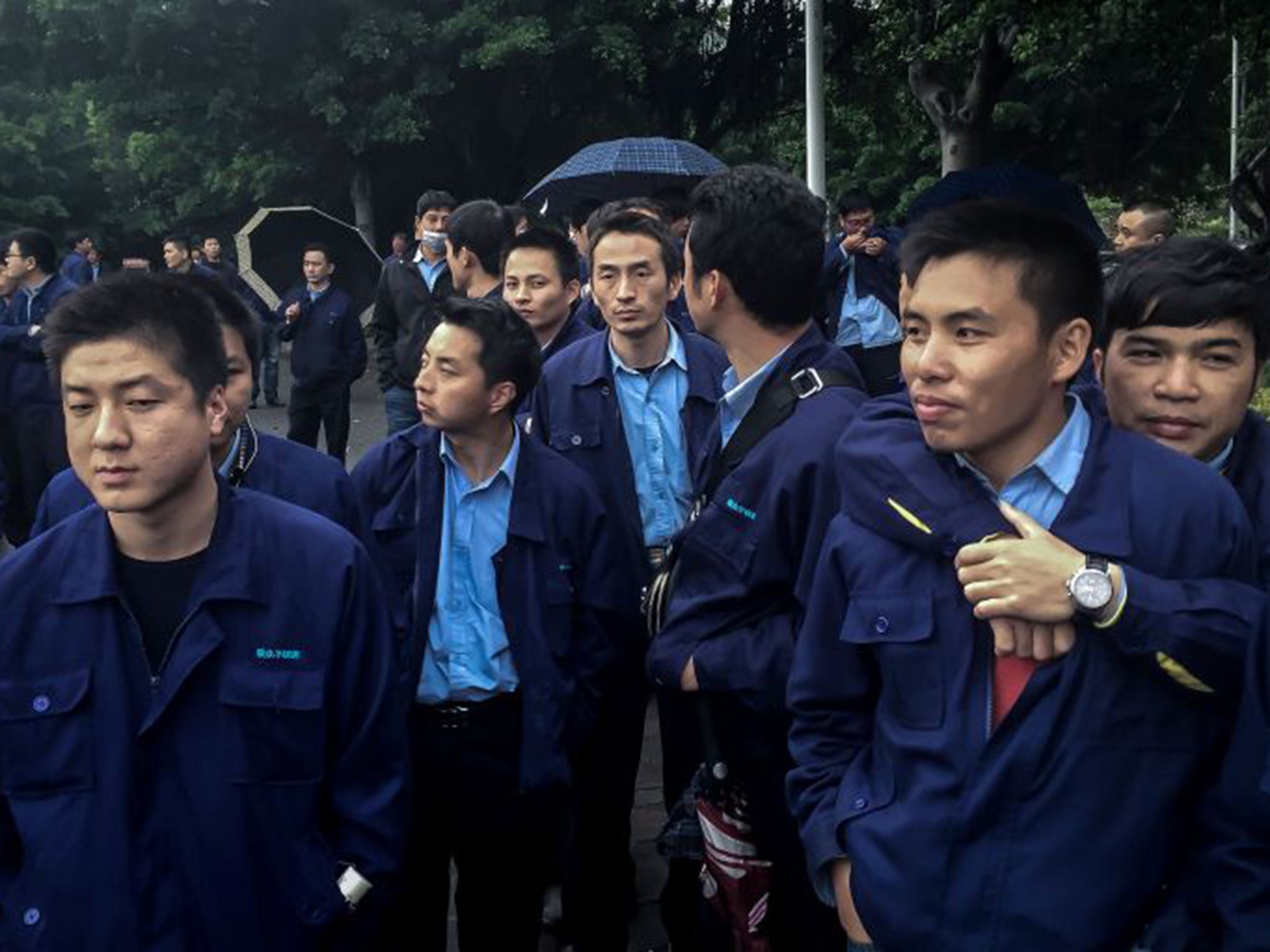China economy: Workers of the ‘world’s factory’ protest against wage cuts and layoffs
In China’s industrial heartland, the Communist Party controls the unions – but workers who feel mistreated refuse to be silenced

Your support helps us to tell the story
From reproductive rights to climate change to Big Tech, The Independent is on the ground when the story is developing. Whether it's investigating the financials of Elon Musk's pro-Trump PAC or producing our latest documentary, 'The A Word', which shines a light on the American women fighting for reproductive rights, we know how important it is to parse out the facts from the messaging.
At such a critical moment in US history, we need reporters on the ground. Your donation allows us to keep sending journalists to speak to both sides of the story.
The Independent is trusted by Americans across the entire political spectrum. And unlike many other quality news outlets, we choose not to lock Americans out of our reporting and analysis with paywalls. We believe quality journalism should be available to everyone, paid for by those who can afford it.
Your support makes all the difference.In the “world’s factory”, the workers are angry and disillusioned.
Strikes and other labour protests have spiked across the country as Chinese manufacturing plants lay off workers and reduce wages in the face of mounting economic headwinds. But the unrest is particularly intense in the southern province of Guangdong, the vast urban sprawl bordering Hong Kong that is the heart of China’s export industry – and its economic success story.
The increase in industrial action represents a challenge for a Communist Party that bases much of its legitimacy on its ability to manage the economy. Experts say it is not about to threaten the party’s vice-like grip on power, but it will ring alarm bells for local officials whose careers often depend on their ability to stamp out stirrings of social unrest.
In December, Guangdong police arrested a handful of activists who have tried to defend workers’ rights and negotiate peaceful settlements to some of the disputes. In the latest confrontation, late last month, hundreds of workers faced off against riot police at a stainless steel factory in the provincial capital, Guangzhou, protesting against wage cuts, layoffs and efforts to force many to resign without proper compensation.
“To me, the company was like a big family, but now it’s treating its employees so badly we have no sense of belonging,” said 32-year-old Chen, who has worked there for nearly seven years. “It is so cold-blooded.”
Chen asked to be referred to only by his family name for fear of retaliation. Other strike organisers and workers who have spoken out have been sacked, or harassed by police.

Problems began when the factory’s Taiwanese owners sold the business to a Chinese state-owned company last year, workers said. Shortly afterward, Chen said, he was told he was being demoted from a lower-level leadership job and would see his salary cut, along with many others.
“We didn’t complain because we understood the company was in trouble,” he said. “But now… we found out our base salary had been halved, to 2,200 yuan (£240) a month.”
“You just can’t live in Guangzhou on the money they are paying,” he said. “If you were to get a bowl and beg under the overpass, you would earn more.”
The China Labour Bulletin (CLB), a Hong Kong-based group that supports workers’ rights, says it recorded 2,774 strikes or protests in China last year, twice as many as in 2014. It says the rise may be partly accounted for by better tracking of strikes on social media, but called the upsurge obvious and massive. The jump began after last August’s currency devaluation and stock market crash and continued to build during the last quarter of last year, mainly in the manufacturing and construction sectors, and most markedly in Guangdong.
Industrial unrest, though, has mainly been fuelled by factory owners’ failure to offer workers proper compensation for layoffs, pay them wages they were due or keep social security payments up to date, experts said. China has labour laws that are supposed to protect workers’ rights, but local governments regularly fail to enforce them, experts say.
Unions also do little to help. The All China Federation of Trade Unions is the largest in the world, with 280 million members and 918,000 full-time employees, but is firmly under Communist Party control, critics say.
At the Ansteel Lianzhong factory in Guangzhou, workers said the union leader had been appointed by the company and backed the management. “We wouldn’t even know who the union chairman was if it wasn’t for this strike,” Chen said. “It’s laughable. Anyone with any common sense would know the union leader must be elected.”
Given the vacuum left by the unions, a small network of labour activists has sprung up in Guangdong, seeking to educate workers about their legal rights and settle disputes with collective bargaining.
In December, dozens of activists were called in for questioning, and seven were detained. Three remain behind bars, the most prominent being Zeng Feiyang, who has been charged with “gathering a crowd to disturb social order”.
Denied access to his attorney, Mr Zeng has been denounced by state media in what critics say amounts to a “smear campaign” that gives him no chance of a fair trial.
The top UN human rights official, Zeid Ra’ad al-Hussein, and the International Trade Union Confederation are among those who have expressed concern or called for the activists’ release.
At the Guangdong factory, last month’s face-off ended without violence, although workers said all their banners, with slogans calling for better pay and conditions, were confiscated. On the seventh day of the strike, police issued a notice saying workers had been “incited and seduced” by a small number of people and warning of arrests if the “illegal” gathering continued.
“We have called the local media, but they didn’t dare cover this,” complained Luo Yebin, 31. “We posted on social media, uploaded videos, but they were deleted. We feel powerless, oppressed and infuriated.”
Chen said he had been forced to leave his three-year-old son with his parents in his home town while he worked in Guangzhou, which often reduced his wife to tears.
Now, he wonders if all his heartbreak and hard work were worth it. “I thought if I could keep working hard, I could get a decent job and have my kid with me,” he said. “My dream is just to be together with my family. But now even that dream is clouded with uncertainty.”
© The Washington Post
Join our commenting forum
Join thought-provoking conversations, follow other Independent readers and see their replies
Comments